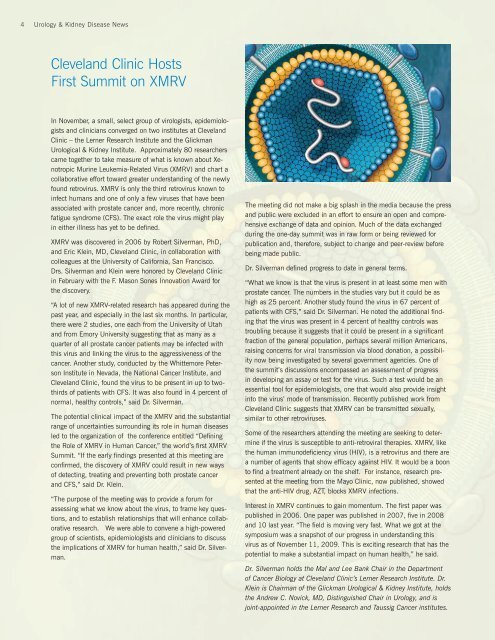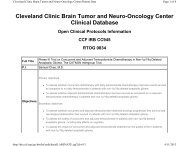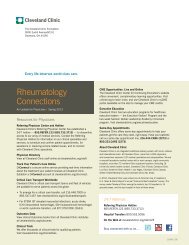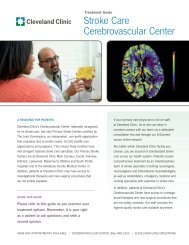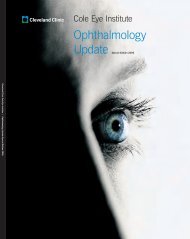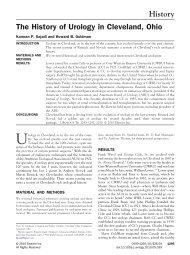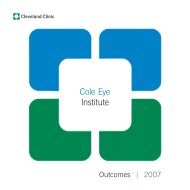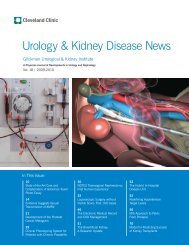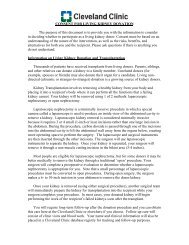Urology & Kidney Disease News - Cleveland Clinic
Urology & Kidney Disease News - Cleveland Clinic
Urology & Kidney Disease News - Cleveland Clinic
Create successful ePaper yourself
Turn your PDF publications into a flip-book with our unique Google optimized e-Paper software.
4 <strong>Urology</strong> & <strong>Kidney</strong> <strong>Disease</strong> <strong>News</strong><br />
<strong>Cleveland</strong> <strong>Clinic</strong> Hosts<br />
First Summit on XMRV<br />
In November, a small, select group of virologists, epidemiologists<br />
and clinicians converged on two institutes at <strong>Cleveland</strong><br />
<strong>Clinic</strong> – the Lerner Research Institute and the Glickman<br />
Urological & <strong>Kidney</strong> Institute. Approximately 80 researchers<br />
came together to take measure of what is known about Xenotropic<br />
Murine Leukemia-Related Virus (XMRV) and chart a<br />
collaborative effort toward greater understanding of the newly<br />
found retrovirus. XMRV is only the third retrovirus known to<br />
infect humans and one of only a few viruses that have been<br />
associated with prostate cancer and, more recently, chronic<br />
fatigue syndrome (CFS). The exact role the virus might play<br />
in either illness has yet to be defined.<br />
XMRV was discovered in 2006 by Robert Silverman, PhD,<br />
and Eric Klein, MD, <strong>Cleveland</strong> <strong>Clinic</strong>, in collaboration with<br />
colleagues at the University of California, San Francisco.<br />
Drs. Silverman and Klein were honored by <strong>Cleveland</strong> <strong>Clinic</strong><br />
in February with the F. Mason Sones Innovation Award for<br />
the discovery.<br />
“A lot of new XMRV-related research has appeared during the<br />
past year, and especially in the last six months. In particular,<br />
there were 2 studies, one each from the University of Utah<br />
and from Emory University suggesting that as many as a<br />
quarter of all prostate cancer patients may be infected with<br />
this virus and linking the virus to the aggressiveness of the<br />
cancer. Another study, conducted by the Whittemore Peterson<br />
Institute in Nevada, the National Cancer Institute, and<br />
<strong>Cleveland</strong> <strong>Clinic</strong>, found the virus to be present in up to twothirds<br />
of patients with CFS. It was also found in 4 percent of<br />
normal, healthy controls,” said Dr. Silverman.<br />
The potential clinical impact of the XMRV and the substantial<br />
range of uncertainties surrounding its role in human diseases<br />
led to the organization of the conference entitled “Defining<br />
the Role of XMRV in Human Cancer,” the world’s first XMRV<br />
Summit. “If the early findings presented at this meeting are<br />
confirmed, the discovery of XMRV could result in new ways<br />
of detecting, treating and preventing both prostate cancer<br />
and CFS,” said Dr. Klein.<br />
“The purpose of the meeting was to provide a forum for<br />
assessing what we know about the virus, to frame key questions,<br />
and to establish relationships that will enhance collaborative<br />
research. We were able to convene a high-powered<br />
group of scientists, epidemiologists and clinicians to discuss<br />
the implications of XMRV for human health,” said Dr. Silverman.<br />
The meeting did not make a big splash in the media because the press<br />
and public were excluded in an effort to ensure an open and comprehensive<br />
exchange of data and opinion. Much of the data exchanged<br />
during the one-day summit was in raw form or being reviewed for<br />
publication and, therefore, subject to change and peer-review before<br />
being made public.<br />
Dr. Silverman defined progress to date in general terms.<br />
“What we know is that the virus is present in at least some men with<br />
prostate cancer. The numbers in the studies vary but it could be as<br />
high as 25 percent. Another study found the virus in 67 percent of<br />
patients with CFS,” said Dr. Silverman. He noted the additional finding<br />
that the virus was present in 4 percent of healthy controls was<br />
troubling because it suggests that it could be present in a significant<br />
fraction of the general population, perhaps several million Americans,<br />
raising concerns for viral transmission via blood donation, a possibility<br />
now being investigated by several government agencies. One of<br />
the summit’s discussions encompassed an assessment of progress<br />
in developing an assay or test for the virus. Such a test would be an<br />
essential tool for epidemiologists, one that would also provide insight<br />
into the virus’ mode of transmission. Recently published work from<br />
<strong>Cleveland</strong> <strong>Clinic</strong> suggests that XMRV can be transmitted sexually,<br />
similar to other retroviruses.<br />
Some of the researchers attending the meeting are seeking to determine<br />
if the virus is susceptible to anti-retroviral therapies. XMRV, like<br />
the human immunodeficiency virus (HIV), is a retrovirus and there are<br />
a number of agents that show efficacy against HIV. It would be a boon<br />
to find a treatment already on the shelf. For instance, research presented<br />
at the meeting from the Mayo <strong>Clinic</strong>, now published, showed<br />
that the anti-HIV drug, AZT, blocks XMRV infections.<br />
Interest in XMRV continues to gain momentum. The first paper was<br />
published in 2006. One paper was published in 2007, five in 2008<br />
and 10 last year. “The field is moving very fast. What we got at the<br />
symposium was a snapshot of our progress in understanding this<br />
virus as of November 11, 2009. This is exciting research that has the<br />
potential to make a substantial impact on human health,” he said.<br />
Dr. Silverman holds the Mal and Lee Bank Chair in the Department<br />
of Cancer Biology at <strong>Cleveland</strong> <strong>Clinic</strong>’s Lerner Research Institute. Dr.<br />
Klein is Chairman of the Glickman Urological & <strong>Kidney</strong> Institute, holds<br />
the Andrew C. Novick, MD, Distinguished Chair in <strong>Urology</strong>, and is<br />
joint-appointed in the Lerner Research and Taussig Cancer institutes.


